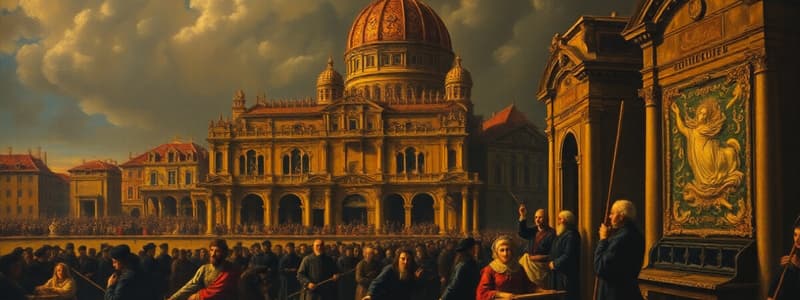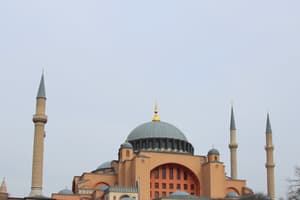Podcast
Questions and Answers
What major event in 1453 allowed the return of Christian scholars to Europe with ancient scriptures?
What major event in 1453 allowed the return of Christian scholars to Europe with ancient scriptures?
- The Fall of Constantinople (correct)
- The establishment of the Holy Roman Empire
- The signing of the Magna Carta
- The beginning of the Renaissance
How did the Black Death contribute to changes in the Church's influence?
How did the Black Death contribute to changes in the Church's influence?
- It led to a greater reliance on the Pope's guidance.
- It generated resentment towards the Church and its authority. (correct)
- It increased loyalty to the Church as a source of hope.
- It caused an influx of new religious orders.
What technological advancement allowed for the dissemination of ideas in Europe during the Renaissance?
What technological advancement allowed for the dissemination of ideas in Europe during the Renaissance?
- The printing press (correct)
- The steam engine
- The compass
- The telescope
Which economic development significantly influenced cultural changes in Italy during the Renaissance?
Which economic development significantly influenced cultural changes in Italy during the Renaissance?
What system broke down as a result of the high death toll from the Black Death?
What system broke down as a result of the high death toll from the Black Death?
Flashcards
The Fall of Constantinople and the Renaissance
The Fall of Constantinople and the Renaissance
The fall of Constantinople in 1453 by the Ottoman Turks led to the return of ancient Greek and Roman scriptures and knowledge to Europe. This influx of ideas sparked a renewed interest in classical thought and learning.
The Black Death and Social Change
The Black Death and Social Change
The Black Death caused widespread death and social upheaval, weakening the feudal system. Governments and societies had to adapt and rebuild, leading to new ideas and systems.
The Printing Press & Knowledge
The Printing Press & Knowledge
The printing press allowed for the mass production of books, spreading knowledge and ideas faster than ever before. The printing press played a key role in the development of science and education.
The Church and the Renaissance
The Church and the Renaissance
Signup and view all the flashcards
Italy & The Renaissance
Italy & The Renaissance
Signup and view all the flashcards
Study Notes
Military: Fall of Constantinople
- Many Christian scholars lived in Constantinople, a center for ancient Greek and Roman ideas.
- The Ottoman Turks overthrew Constantinople in 1453, forcing Christians to return to Europe with ancient texts and new ideas.
Religious: Declining Power of the Church
- Many people blamed God for the Black Death, questioning the Church's authority.
- Papal scandals led to disillusionment with the Church.
- Loss of faith in the Church led people to explore alternative practices.
Social: Impact of the Black Death
- High death toll from the Black Death caused the feudal system to collapse.
- European powers sought new ways to rebuild their societies.
Technology: Printing Press
- Johannes Gutenberg developed the printing press in Europe in 1440.
- Increased access to Bibles, non-religious books, music, and scientific works.
- Wider distribution of information and ideas.
Economic: Increased Trade
- Italy's trade with other European countries increased significantly.
- Increased travel broadened people's perspectives.
- New ideas challenged traditional societal structures and art styles.
- Increased experimentation in art, thought, and daily life.
Studying That Suits You
Use AI to generate personalized quizzes and flashcards to suit your learning preferences.




